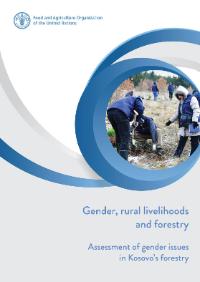Resource information
The main purposes of this research are to identify and analyse the role of women and men in the forestry sector in Kosovo, and women’s and men’s ownership and use of forests. The report also aims to analyse the gender issues within the institutional policy and legal framework that governs forest management, in order to provide recommendations on how to mainstream gender in forest policies in Kosovo more effectively. The research forms part of a project entitled, “Support to Implementation of the Forest Policy and Strategy in Kosovo” (GCP/KOS/005/FIN) funded by Finland, which aims to increase the forestry sector’s contribution to the national economy through the sustainable use of forest resources, taking into account multipurpose forestry, and the economic, social and environmental benefits of forests, as well as the sector’s contribution to climate change mitigation. The study demonstrates women’s limited access to decision-making and information compared with men, and women’s pen ding property rights. Furthermore, the high unemployment rate is the main obstacle identified by rural community members, especially women. The report also demonstrates the interests of rural women in improving their skills in the collection, processing and marketing of non-wood forest products (NWFPs). Consequently, the report shows the importance of improving women’s access to information, capacity development and decision-making. It concludes by emphasizing that NWFPs have strong potential fo r reducing food insecurity and poverty in the regions of the study, particularly when both women and men are effectively supported.


